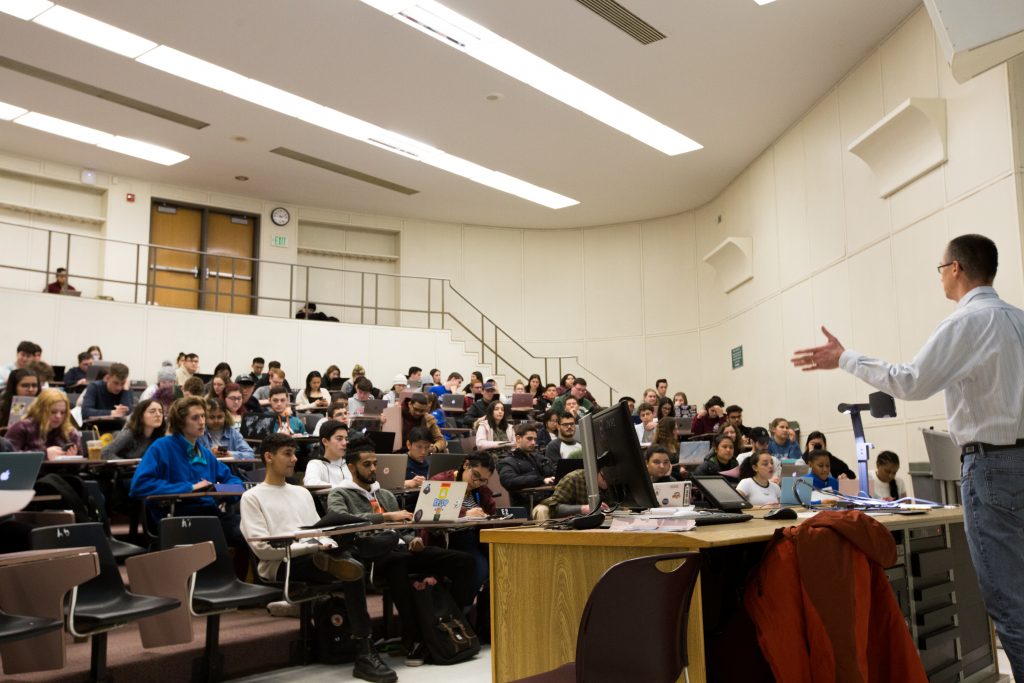If a Binghamton University student receives an F in a class, they have the opportunity to retake the course and average their failing grade with the grade they received on their second attempt. But soon, that rule might be changing.
At the last Student Association Congress meeting, Doug Wehbe, vice president for academic affairs (VPAA) and a senior double-majoring in computer science and mathematics, proposed a new policy that would allow students to retake classes where they received a C-minus or below and replace it with a new grade. The new grade would correspond with the grade they received on their first attempt, or the average of an F and the grade they received on their second attempt — whichever grade is higher.
According to Wehbe, the new policy would remove the incentive to intentionally fail a class in order to receive a better grade in the future. With the current course retake policy, a student could purposely fail a course to earn a second attempt at a class in hopes of getting a better grade. For example, if a student were initially set to pass a class with a C-minus, intentionally failed the course and received an A on the second try, they could receive a C, the average of the two grades.
Wehbe said he believes the new policy’s approach to course retakes would not affect students who received a C-plus or better in the course, but would be more fair to students who earned a C-minus or D.
“Averaging this artificial F and seeing if that would have been better on their second attempt can make a student who got a D on their first attempt go from a 1.0 to, say, a 2.0 if they get an A on their second attempt,” Wehbe said. “Whereas right now, the A on their second attempt would not count toward their GPA.”
Course-retake policies have been proposed multiple times by previous VPAAs, but they never were implemented because of fears that changing the retake policy could lead to grade inflation and further strain administrative resources. The policies called for a uniform, University-wide system, as well as a complete replacement of the original grade.
There were also concerns that the previous proposals made retaking courses too desirable for students, and could lead to a difference between the grades of students with the financial ability to retake courses and those who could not afford to do so. Wehbe said his proposal aims to alleviate those fears.
“There’s already financial disparity between students who can afford to retake courses and students who can’t, but previous proposals that made course retake too desirable would have absolutely exacerbated the gap between the GPAs,” Wehbe said. “We’re trying to be mindful that not all students can afford to retake courses.”
As with the current policy, both grades would still appear on the student’s official transcript. The VPAA’s office plans to start the policy through Harpur College, and Wehbe said he expects it to eventually be offered to the other schools, although it is not currently intended to become a University-wide policy.
After the proposal is finalized, it will be submitted to the Harpur College Council’s Educational Policy and Priorities Committee. The committee will decide if they want to put it on the Harpur College Council’s agenda, where it could be voted on.
Jon Lavis, a senior majoring in business administration, said he supports the change. According to Lavis, the proposed policy seemed more reasonable than the current method.
“What you did in the past still matters, what you do now still matters, so an average makes a lot of sense to me,” Lavis said.
But others feel differently. Lowell Klipstein, a freshman majoring in biomedical engineering, said while this is a step in the right direction, it would still be better if the retake grade fully replaced the original one.
“I think the new retake policy is more beneficial to students, because it does take away the intention for students to just say, ‘Okay, I’ll fail this class and take it again and get a better grade,’” Klipstein said. “But, I do think there should be a policy where you are able to retake that course and get a new grade, because it shows you didn’t fail the course and you’re trying again.”



